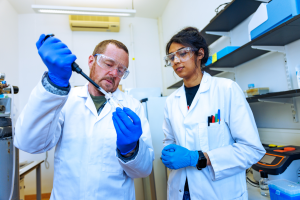Bangor University and the UK Centre for Ecology & Hydrology are working with Denbighshire County Council on a project to help inform and improve the development of green spaces in Rhyl, North Wales.
The partners will look at public perceptions of changes to green spaces around the area, and how this information can shape future nature recovery work.
As part of its Climate and Ecological Change Strategy, Denbighshire County Council plans to develop new woodland and urban wildflower grasslands in Rhyl and across the county.
Benefits of this climate and ecological work include improved biodiversity, carbon storage, air pollution removal and noise mitigation, as well as positive effects on health and wellbeing.
The joint project with Bangor University and the UK Centre for Ecology & Hydrology will add to existing social survey and biodiversity data from previous initiatives in Rhyl, and will use new models to calculate the benefits from extra carbon storage, better air quality and less noise.
Engagement will take place with some residents living near planned new biodiversity schemes, along with online surveys throughout Wales.
These will explore people’s perceptions of biodiversity benefits and gather further understanding of their thoughts and level of support for schemes such as tree planting and wildflower meadows.
The combination of residents’ perceptions and scientific modelling and monitoring in this project will help inform future decisions and project planning.
Cllr Barry Mellor, Lead Member for Environment and Transport, said: “We are pleased to be working together with Bangor University and the UK Centre for Ecology & Hydrology on this important collaboration that will help us map out future approaches to ecologically positive work, in Rhyl and across the county.
“I look forward to seeing deliverables from the project which will include results of co-benefits analysis such as improved air quality, reduced noise; findings from surveys and interviews with local residents; and guidance to help us plan and implement new biodiversity improvements with greater public engagement.
“The results from the project will help support improved delivery and benefits of our climate and ecological change projects, to aid our contribution to nature’s recovery and tackling climate change.”
Prof Thora Tenbrink, Professor of Linguistics and Director of the Places of Climate Change Research Centre, said: “This project offers a unique opportunity to establish important links between Denbighshire County Council, UKCEH and Bangor University, and including the general public. We are excited to learn how people’s views relate to the Council’s plans and measurable benefits generated by these climate-relevant actions. Our hope for the future is to co-create climate-friendly solutions that make sense for everyone.”
Professor Laurence Jones, urban theme lead at UKCEH, said: “This is an exciting opportunity to work with Denbighshire County Council and Bangor University, and use the latest models to calculate how neighbourhood green space improves the local environment for the residents of Rhyl.”
This work has been supported by the UKRI-funded RECLAIM Network Plus grant (EP/W034034/1).





